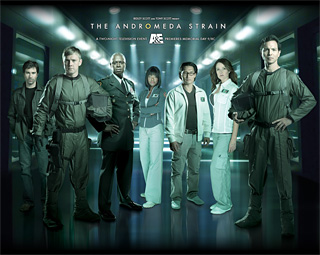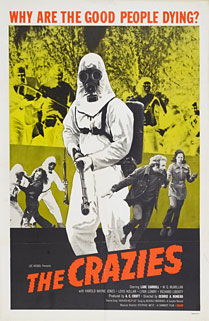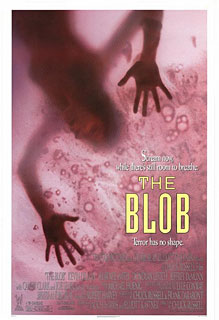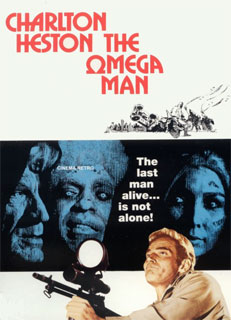 At the end of this month, the cable channel A&E will premiere a two-part remake of the film The Andromeda Strain (1971). Though I’ve never been much of a fan of that particular film, I’ve always been intrigued by the central premise that humanity could be put into peril by something as seemingly innocuous as a microscopic virus.
At the end of this month, the cable channel A&E will premiere a two-part remake of the film The Andromeda Strain (1971). Though I’ve never been much of a fan of that particular film, I’ve always been intrigued by the central premise that humanity could be put into peril by something as seemingly innocuous as a microscopic virus.
In the original version of The Andromeda Strain, most of the inhabitants of the small town of Piedmont, Utah, die in mid-stride after a military satellite crashes nearby. Figuring that some sort of super-virulent space virus must be responsible for the deaths, a team of government scientists tries their best to stop the spread of the virus, code-named “Andromeda.”
 In this film, the team of government agents is presented as altruistic with the single goal of eliminating the virus no matter the personal or political toll. This concept would be turned on its head in the George Romero film The Crazies (1973). Almost certainly a reaction to The Andromeda Strain, The Crazies deals with a virus code-named “Trixie” that’s accidentally released into a small Pennsylvania town’s water supply after a jet crashes nearby. Anyone exposed to Trixie begins to turn (well) “crazy.” Some of those affected act homicidal towards the government agents while others blunder around seemingly unaware of their surroundings.
In this film, the team of government agents is presented as altruistic with the single goal of eliminating the virus no matter the personal or political toll. This concept would be turned on its head in the George Romero film The Crazies (1973). Almost certainly a reaction to The Andromeda Strain, The Crazies deals with a virus code-named “Trixie” that’s accidentally released into a small Pennsylvania town’s water supply after a jet crashes nearby. Anyone exposed to Trixie begins to turn (well) “crazy.” Some of those affected act homicidal towards the government agents while others blunder around seemingly unaware of their surroundings.
Much like The Andromeda Strain, the government officials of The Crazies, here the Army, are shown to be relying on technology in order to stop the spread of the virus. Unlike the Andromeda Strain, however, in The Crazies these devices don’t work all that well, and ultimately government bureaucracy gets into the way of containing the virus.
 The Andromeda Strain wasn’t the first film to present the idea that something tiny might arrive from space to threaten humanity. The title creature of The Blob arrived on the Earth in 1958 as a seemingly innocuous glob of “goo” that grew gigantic by gobbling up every person it could find. The Blobwas remade in 1988 and given a The Crazies twist. This time, the creature of The Blob isn’t alien, but a military space experiment gone wrong. Here too, the team of scientists and military personnel are more interested in corralling the creature rather than protecting the population of the town.
The Andromeda Strain wasn’t the first film to present the idea that something tiny might arrive from space to threaten humanity. The title creature of The Blob arrived on the Earth in 1958 as a seemingly innocuous glob of “goo” that grew gigantic by gobbling up every person it could find. The Blobwas remade in 1988 and given a The Crazies twist. This time, the creature of The Blob isn’t alien, but a military space experiment gone wrong. Here too, the team of scientists and military personnel are more interested in corralling the creature rather than protecting the population of the town.
The first half of the television mini-series The Stand (1994) dealt with a strain of superflu called “Captain Tripps” wiping out much of humanity while Twelve Monkeys(1995) depicted a future where people are forced to live deep underground in order to escape a virulent virus that has driven humanity to the brink of extinction.
Outbreak, also from 1995, had an Ebola like virus called “Motaba” being accidentally introduced to a small California town and the government coming in to contain the outbreak. Like The Blob remake, in Outbreak, a certain faction of government officials is only interested in containing the virus to use as a weapon and is willing to eliminate the town’s entire population to keep their virus secret.
 Except the military should be careful what viruses they choose to keep. The Omega Man, also from 1971, depicted a world of people turned mutant after germ warfare while the semi-remake I Am Legend (2007) had a genetically engineered virus meant to cure cancer known as “KV” that instead turns those infected into cannibalistic mutants.
Except the military should be careful what viruses they choose to keep. The Omega Man, also from 1971, depicted a world of people turned mutant after germ warfare while the semi-remake I Am Legend (2007) had a genetically engineered virus meant to cure cancer known as “KV” that instead turns those infected into cannibalistic mutants.
Borrowing heavily from both the original I Am Legend novel and The Crazies, the film 28 Days Later (2002) showed an England overrun by people infected with the “Rage” virus bent on homicide while the sequel 28 Weeks Later (2007) had the U.S. military heading up the repopulation of the U.K. that’s willing to eliminate every civilian when this virus unexpectedly returns.
Then again, viruses aren’t always depicted as being bad in the movies. Let’s not forget that the virus that causes the common cold was the ultimate destruction to the Martians in The War of the Worlds (1953/2005). I guess the Martians were already immune to “Andromeda,” “Trixie,” “Motaba,” “KV” or “Rage.”